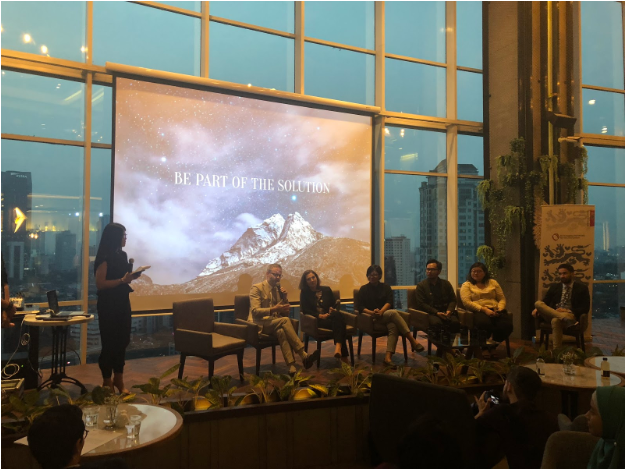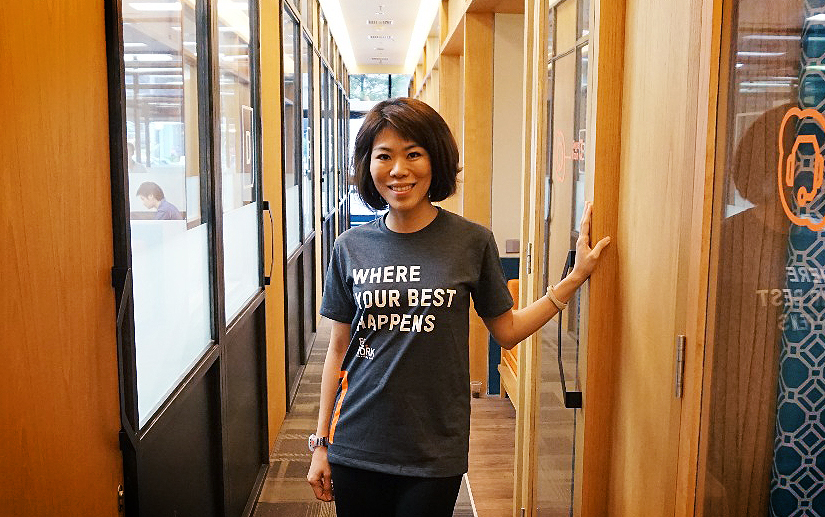Tell us a bit about yourself.
I’m Vanessa Hendriadi Li, and I’m CEO and co-founder of Go-Rework Coworking Space.
You’ve had extensive experience working in IT, marketing, finance and you also have a background in chemical engineering. How did you come to starting your own co-working space?
Even though I have a technical background, I have always loved connecting with people and connecting people together as well. Ever since I was a teenager, I have been passionately involved in different student organizations, something which I carried towards my adult life. Even outside of work and business school, I found myself either being involved in different clubs or even starting one. So I have a huge passion for community building.
On the professional side, when I came back to Indonesia, I was in charge of the market expansion of my family business back then. Part of it was finding real estates, finding new locations, understanding markets in a new location as well. So, because of that, I found that building a co-working space and platform is a great combination of both my knowledge and expertise, my experience in real estate and my passion for community building. When I started Rework, I found that is what I really wanted to do and is what I am passionate about.
Co-working spaces in Jakarta are really starting to boom. Just recently, Rework merged with GoWork to become Go-Rework – are co-working spaces the future of work?
In a lot of mature markets, you see that more and more companies, not just startups, but also corporates are embracing this new working environment. Because technology has changed everything – the way we live, and the way we work. I remember even a decade ago, when I was living in the States, more than 95% of people do the 9-5 and when they come home from work, that was it. These days when we wake up, we check our WhatsApp, we check our emails, and our social media. Everywhere we go, when we are stuck in traffic or whatnot, we are able to work almost anywhere and at anytime. The fact that vast majority of work spaces look the same as they did decades ago is really screaming for disruption. So I believe that this is how people will work in the near future. Co-working spaces will enhance collaboration, it enhances learning and networking, and integrates more live and play. So that is what we are trying to build in Indonesia.
In terms of the startup ecosystem in Indonesia, where do you see it going in the next 10 years?
I think startups are growing very rapidly in Indonesia. The growth of SMEs in Indonesia is the largest and fastest-growing in the Southeast Asian region. The timing as well is great because right now more than 70% of people are in the workforce (below 35 years ago) which means that in the next decade most of them will be in the workforce. Technology adoption is getting much easier and faster. My husband used to work in China for 6 years and we moved back to Indonesia 5 years ago. When we got here, he realized that Indonesia is just like China when he arrived. I think the demographic and profile is very similar in terms of the size of the market and also the fast adoption of the internet. So I think that the growth of startups will still continue, now we just need to ensure that the quality is there. Education is very important to ensuring the country gives birth to great quality companies.
In terms of being a woman in this startup space, have you encountered any obstacles in your career?
I think my biggest challenge now is time. It’s about balancing work and family, especially being a mother of two young children. I have a 4.5 and 3 year old, and I don’t feel like I spend enough time with them. I don’t know if they share the same feelings, but I wish I could spend more time with them. I see many startup founders who are still quite young and possibly single with no kids, but I also have the advantage of experience. Because I have a lot more limited time, I’m forced to be creative and learn how to prioritise things well. That’s my challenge in being a woman entrepreneur.
In terms of challenges in the market, I think it’s more of a benefit than barrier at least in my experience, as there aren’t as many female entrepreneurs. It’s about proving to yourself that you can do everything, and believing that being a woman is not a limitation. Then, people will start to notice, and the market will start to notice you.
Women tend to have a slightly stronger ability to read people and understand feelings by connecting with people, not just on the head but also on the heart. So even dealing with my team, I spend a lot of time with them not only in trying to reach targets but I also put a lot of time and understanding into coaching my team members. I think that’s very important. As a founder, not spending enough time communicating with your team, is one of the culprits of not being able to grow sustainably because I believe that it’s the people in the team that creates the business and grows the company.
Does being a leader come naturally to you?
Like I said, I love connecting with people, because of my interests and because of my belief that everyone is interesting and has a story to tell. So I like to coach my team, of course I have to balance my time as well – with fundraising, with deliveries that we need to present to investors, as well as the recent merge. We have an aggressive plan ahead for the company, however balancing that with good team communication is crucial.
If you could tell young entrepreneurs one piece of advice what would it be?
Don’t be afraid to chase your dream. I think we tend to be very hard on ourselves, at least I am a lot of the time, but to me making progress everyday gives me so much happiness. So it doesn’t have to be a leap, doesn’t even have to be a significant achievement everyday – as long as you move forward everyday. Part of it is being comfortable with uncertainties. We live in a world where nothing is certain, so be comfortable with that and don’t be afraid to chase your dreams.

